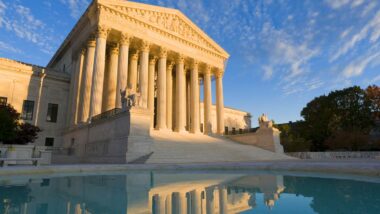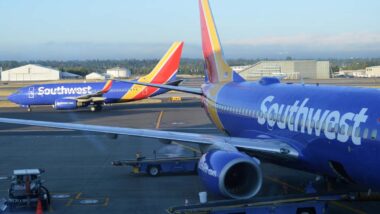Top Class Actions’s website and social media posts use affiliate links. If you make a purchase using such links, we may receive a commission, but it will not result in any additional charges to you. Please review our Affiliate Link Disclosure for more information.
United Airlines has asked for the dismissal of a class action lawsuit accusing the airline of violating the requirements of the CARES Act with the misuse of coronavirus relief funds.
Worker Kenneth England had filed his United Airlines class action lawsuit claiming that he and other employees bore the cost of the coronavirus’s profound impact on his employer. In his eyes, the company passed on this cost in violation of an agreement that the airline made with the federal government to receive $5 billion in aid. United Airlines is fighting back, and has asked an Illinois federal judge to dismiss England’s allegations. According to the airline, the agreement was honored and England did not have a right to sue in the first place.
The United Airlines CARES Act funds class action lawsuit was brought forward when England claimed that the workers were required to take 20 unpaid days off in light of the coronavirus crisis. In his eyes, this went against United Airlines’ agreement with the federal government which determined that the workers would not bear the financial hit of the coronavirus, as the airline reached $5 billion from the Payroll Support Program.
However, in an update to this legal news, the airline assertes that England did not have the right to file the United CARES Act violation class action lawsuit at all. The airline argues that the worker did not claim that the airline breached a contractual obligation to him, which might have qualified him to file a lawsuit, nor did he assert that the CARES Act would allow him to sue at all.
The airline then argued that the worker should not be able to use as an “intended third-party beneficiary” of the Payroll Support Program agreement made between United Airlines and the federal government. United stresses that only the U.S. Treasury has the power to decide if a company has violated its agreements, not another party.
To support this claim, the airline pointed to a decision made in a previous case. According to the company, the previous situation was comparable to the one at hand, in which a high court did not allow a third-party beneficiary to “enforce an agreement with the federal government,” as the airline argues England is attempting to do.

The company stressed that United did not negotiate the terms of the contract with the federal government, and instead, the agreement “incorporated the statutory obligations and the participants’ agreement to abide by them.”
United Airlines then went on to insist that it did not violate the Payroll Support Program, as England had argued. The airline stressed that it had not furloughed any workers, reduced pay rates, or taken away benefits. According to United, “it is using every penny of the PSP funding to cover salaries, wages, and benefits of its employee.”
England argued the opposite, saying that the company had not argued that terms of its agreement. He noted that he and other workers were required to take 20 days off without pay, which in his eyes, constituted a violation of the CARES Act. He noted that this unpaid time off did indeed affect his compensation, and that of many others.
To support his point, he points to an email sent by Executive Vice President of Human Resources and Labor Relations Kate Gebo. The email reportedly stated that, because the government funding only covers a part of United’s payroll costs, the company would be “implementing an unpaid time off program for domestic M&A employees to align with less flying, fewer customers, and less working time for frontline employees.”
The email reportedly went on to inform workers that “Effective between May 16 and Sept. 30, domestic M&A employees will be required to take 20 unpaid days off.”
Although United Airlines has argued against the suit, in England’s eyes, this breach of contract financially injured him and others. He seeks compensation on behalf of himself and similarly affected workers.
How has the coronavirus affected your workplace? Did you have to take time off? Share your experience in the comments below.
Kenneth England is represented by Douglas M. Werman, Maureen A. Salas, Sarah J. Arendt, Zachary C. Flowerree, and Michael M. Tresnowski of Werman Salas PC.
The United Airlines Payroll Support Program Violation Class Action Lawsuit is Kenneth England, et al. v. United Airlines Inc., Case No. 1:20-cv-02877, in the U.S. District Court for the Northern District of Illinois.
Join a Free Coronavirus Class Action Lawsuit Investigation
If you believe your rights were violated in a way that is directly related to the coronavirus pandemic, you may qualify to join this coronavirus class action lawsuit investigation.
ATTORNEY ADVERTISING
Top Class Actions is a Proud Member of the American Bar Association
LEGAL INFORMATION IS NOT LEGAL ADVICE
Top Class Actions Legal Statement
©2008 – 2024 Top Class Actions® LLC
Various Trademarks held by their respective owners
This website is not intended for viewing or usage by European Union citizens.
















One thought on United Airlines Asks to Dodge CARES Act Class Action
I was laid off from American on 6/30, with my last day to report to work on 7/10. My understanding of Section 4112 of the CARES Act no involuntary action could be taken prior to 10/1. I was paid through 9/30 but it appears the company used this funding in lieu of a standard severance to get rid of people, which I believe is not the intent of the CARES to save jobs.